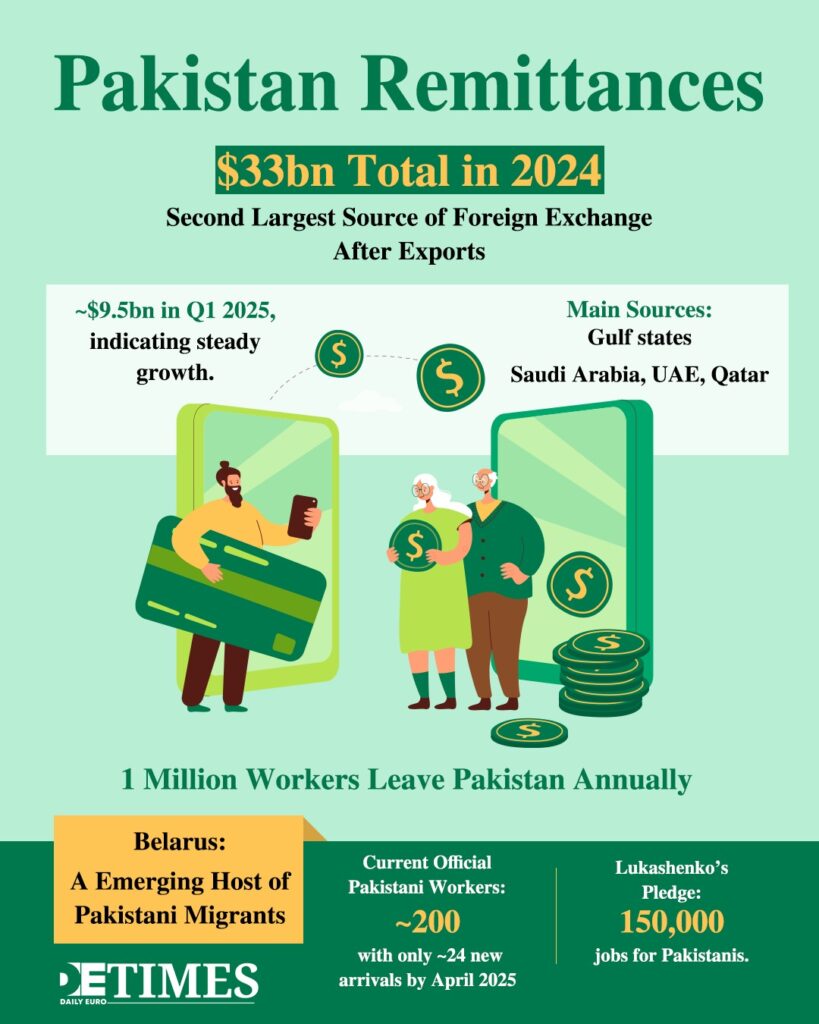In April 2025, Aleksandr Lukashenko announced that Belarus would welcome up to 150,000 workers from Pakistan.
The Pakistani Prime Minister Shehbaz Sharif described this invitation as a “gift” to the people of Pakistan.
Belarus currently faces over 198,000 unfilled job vacancies nationwide. Meanwhile, Pakistan sent more than 151,000 skilled workers to Gulf states just in the first quarter of 2025.
On paper, it looks like a straightforward trade. Belarus gains workers to run factories and build infrastructure, while Pakistan eases unemployment and gains remittance income.
In 2024 alone, Pakistani remittances topped an estimated $33 billion. About a million Pakistani skilled workers depart annually for overseas jobs. Every destination counts when the goal is numbers, regardless of who’s on the receiving end.
Trade between Belarus and Pakistan hovered between $50 million and $65 million in 2020 – the last year figures are available. Plans to grow this to $1 billion faded quietly.
Around 200 Pakistanis already work in Belarus. By late April, however, Lukashenko noted only “two dozen” had arrived, exposing a gap between promise and reality.
Borders Have Long Memories
During the 2021-22 border crisis, Belarus facilitated migration flows from the Middle East, Africa, and South Asia – including many from Pakistan. Thousands found themselves stranded in forests along Poland, Latvia, and Lithuania’s borders, without food, shelter, or legal protections.
Belarusian officials were accused of weaponizing migration to push back against Western sanctions. This tactic worked effectively before. Poland, Lithuania, and Latvia remember the 2021 crisis, when border guards resorted to pushbacks and dozens died.
These memories shape how neighbouring states view Minsk’s latest announcement. Offering 150,000 workers means more than just filling factories; it presents new strategic options. Poland, Lithuania, and Latvia have accused Belarus of luring migrants with tourist visas and pushing them toward EU borders as part of a bargaining chip.

What Sits Behind the Handshake
The West still does not recognize Lukashenko’s presidency following the disputed 2020 election and harsh crackdown on dissent. Sharif’s visit allowed Lukashenko to boost his image as a legitimate international partner. The two countries signed agreements on military cooperation and defense industry collaboration through 2027.
Military deals between challenged governments rarely are purely defensive. Pakistan needs the numbers to meet remittance goals. Belarus needs workers and potentially more to gain concessions from it's EU neighbours.
But each worker Minsk invites can become a bargaining chip, especially given Belarus’s border with three EU countries.
Pure Economics
Labour migration creates winners.
Sending countries collect remittances, receiving countries fill jobs, and workers earn more than at home. The equation works – until it doesn’t. Until those workers are seen as useful for purposes beyond their promised jobs. Until borders close and workers become pawns.
For the EU, Sharif’s visit rekindles painful memories from 2021-2022. Pakistan benefits from contracts signed today. Workers benefit from wages earned tomorrow. What happens after that falls outside the deal.
Economic deals often follow the same rules as individual deals: every party acts in their self-interest. Morality matters only when it aligns with practical goals. History delivers consequences – justice does not.
The workers heading to Belarus will learn, as earlier migrants have, that migration always carries risk. That risk grows when the host country answers to no larger alliance, respects no outside oversight, and borders wealthier neighbors.
Minsk solves its labor shortage, Islamabad collects remittances. Everyone benefits until the next time pressure must be applied elsewhere. The system operates exactly as intended.
Keep up with Daily Euro Times for more updates!
Read also:
Belarusian Spy Network Uncovered in Europe
Baltics Pull the Plug for Energy Independence
EU-NATO: Brussels Summit and New Baltic Security






